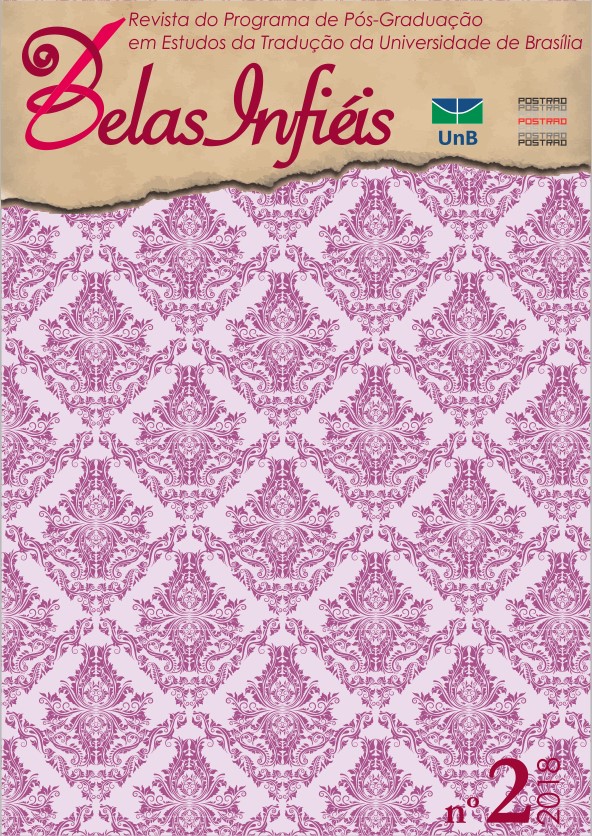Estudos feministas de tradução:
um recorte de pesquisas do Programa de Pós-graduação em Estudos da Tradução (PGET-UFSC)
DOI :
https://doi.org/10.26512/belasinfieis.v7i2.15266Mots-clés :
Estudos Feministas de Tradução, História da Tradução, PGET-UFSCRésumé
Diante da invisibilidade imposta à s mulheres no campo da Tradução, este trabalho tem o objetivo de analisar as contribuições teórico-práticas aos Estudos Feministas de Tradução desenvolvidas no programa de Pós-Graduação em Estudos da Tradução (PGET) da Universidade Federal de Santa Catarina (UFSC). Para tanto, apresentamos as teses e dissertações defendidas neste programa ”“ por ser o pioneiro do Brasil em Estudos da Tradução e do qual fazemos parte ”“, de 2005 a 2018, que abordam a tradução em sua intersecção com os Estudos de Gênero. Esperamos, com este levantamento, auxiliar a visibilidade de pesquisas desenvolvidas neste campo de estudos e favorecer a formação de redes que conectem pesquisadoras/es de diversos locais que estejam interessadas/os na temática, como parte de uma das propostas do Grupo de Estudos Feministas na Literatura e na Tradução (GEFLIT/UFSC). Do total de 273 dissertações e 114 teses analisadas, apenas 20 apresentaram os critérios utilizados na busca e compuseram o corpus. Desses 20, 18 abordaram questões de gênero, no entanto, apenas nove identificaram-se inseridas nos Estudos da Tradução em sua intersecção com os Estudos de Gênero. Disso, conclui-se que os estudos feministas ainda têm encontrado resistência no diálogo com outras áreas do conhecimento. Tal fato reflete a diferença social de gênero e, consequentemente, o caráter gendrado da linguagem e da cultura escrita. Nesse sentido, pesquisadoras como Rosvitha Blume (2010), Luise von Flotow & Farzaneh Farahzad (2016) e Olga Castro (2017) chamam atenção para a necessidade do resgate histórico de tradutoras bem como para a importância de pesquisas e experiências de tradução conscientes do seu papel feminista, como aqui apresentamos.
Téléchargements
Téléchargements
Publié-e
Comment citer
Numéro
Rubrique
Licence
Copyright Statement
Given the public access to this journal, the texts are free to use but requires the recognition of the original authorship and initial publication in this journal to be properly stated.
The journal allows the use of works published for non-commercial purposes, including the right to submit the work to publicly accessible databases. Published contributions are the sole and exclusive responsibility of the author(s).
- When submitting papers to be evaluated by the Belas Infiéis journal, the author(s):
- Declare that the contents of the contributions are original and of their original creation, being entirely responsible for their content if there is an objection by third parties.
- Claim to be aware that they should not commit academic plagiarism.
- Declare that the manuscript has not been published, completely or partially, in Portuguese or another language. If it is a translation it should be submitted to the Translated Articles section.
- Declare that the manuscript is not being evaluated by other journals.
- Declare that the manuscript was not submitted to another journal simultaneously.
- Commit(s) to inform the journal of any kind of error or inaccuracy in their contribution (published, in evaluation or in editing) and to collaborate with the editors to make due corrections of the article (when in evaluation or editing) or erratum/retraction (after publication).
- Declare that there is no conflict of interest regarding the published work.
- Authorize its release if it is accepted for publication without any kind of monetary compensation.
- Agree to assign non-exclusive rights to publication to the magazine, remaining free to make their contribution available in other media as long as the publication of the first version in Belas Infiéis magazine is mentioned. They also authorize Belas Infiéis to assign their texts for reproduction in content indexers, virtual libraries and similar platforms.
- Maintain copyright and grant the journal the right of first publication, the work being licensed under theCreative Commons Attribution License.
- Is/Are allowed and encouraged to publish and distribute their work online after the editorial process, which may increase the impact and citation of the published work.
- Authorize the editorial team to make textual adjustments and to adapt the article to the publication rules, when necessary.



















